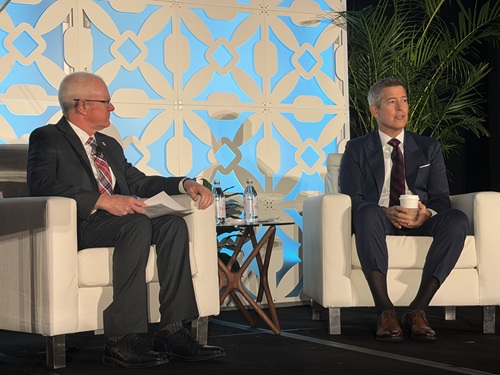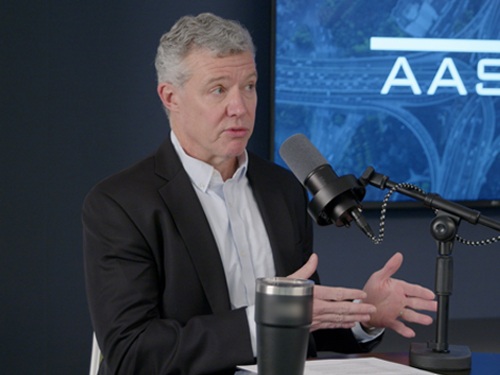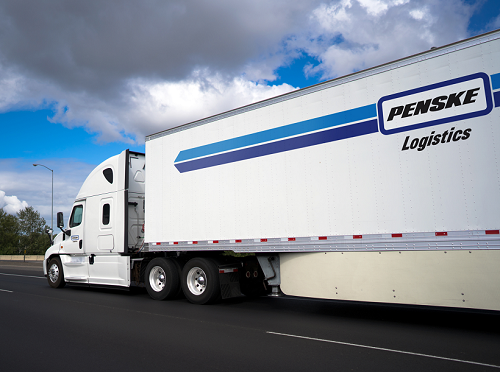According to the 2023 “State of Logistics” report issued this week, U.S. domestic logistics networks as well as global supply chain systems are seeking to make themselves more resilient after weathering the disruptions caused by the COVID-19 pandemic among other issues.
[Above photo by Penske Logistics]
“To a large degree, the period studied by this year’s report – calendar year of 2022 and the early months of 2023 – has been about the resetting of relationships, assumptions, and practices for a world transforming,” according to this report, compiled by global consulting firm Kearney annually for the Council of Supply Chain Management Professionals and presented by Penske Logistics.
“A central feature of this transformation is a shift among logistics executives from strictly transactional perspectives to a more strategic and holistic sense of their function’s role,” the report noted. “The transformations rippling through the logistics sector are the result of rapid evolutions in delivery requirements and consumer expectations, just as old assumptions about supply chain stability are being disrupted.”
The report went on to emphasize that the age of building supply chains solely around cost-reduction considerations “is over” with a new value taking center stage – resilience.
“Logistics leaders are responding by taking a more holistic and comprehensive view of their value chains,” Kearney’s researchers said. “They are diversifying their sourcing to avoid overreliance and to ensure ample workarounds in the case of sudden disruption. They are investing in technologies and human capabilities to enhance organizational awareness of what’s happening across the entire network.”
This also means logistics providers are also “actively resetting” their supplier and carrier commitments, their approaches to customer service, and their expectations of what lies ahead. “Because if the past few years have been any guide, it is wise to make discretionary resets when one can—rather than be compelled to improvise them when one must,” the report noted.
Many state departments of transportation are also placing renewed focus on resilience in the context of infrastructure design, construction, and maintenance – illustrated by the emphasis areas of Roger Millar, secretary of the Washington State Department of Transportation and current president of the American Association of State Highway and Transportation Officials.
“Resilience to me means how we maintain a safe, sound, and smart transportation system – one prepared for a lot more than just climate change,” he pointed out during a recent presentation to AASHTO’s staff.
“Transportation has to be ready to handle natural and human caused disasters,” Millar said. “But that also includes demographic and economic changes as well. And we as state DOTs have to be prepared for and adapt to whatever happens.”
In its 2023 “State of Logistics” report, Kearney’s researchers pointed out that geopolitical disruptions, increasingly potent cyberattacks, and an intensifying cycle of climate-related natural disasters are all placing trade and distribution networks under increasing stress—at precisely the moment when those networks are becoming more essential to the bottom lines of companies in the U.S. and abroad.
Inflation, however, remains a “lingering shadow” across the U.S. economy, according to the report – another issue state DOTs are very familiar with.
“While prices are down from the highs of 2022, they remain elevated across many categories – and much will ride on whether monetary policy can bring inflation to heel without compromising overall economic health,” Kearney’s researchers said.
A primary source of this inflation is also one of the engines of America’s persistent growth – a hot labor market, in which unemployment is at or near the lowest levels seen in a half-century. This relative scarcity of “willing and able workers” has had a particularly forceful impact on the logistics sector, the report said.
[Editor’s note: State departments of transportation are struggling with the same labor shortage issue; one addressed in a knowledge session held at the AASHTO 2023 Spring Meeting in Seattle.]
A trend highlighted in Kearney’s research that may impact infrastructure demand – especially infrastructure overseen by state DOTs – is that, for many businesses, reshoring now appears to have shifted from a “strategic possibility” to a “market reality.”
“U.S. companies have been increasingly moving supply chains closer to home,” the report noted, with American imports of Mexican manufactured goods grew a staggering 26 percent according to Kearney’s Reshoring Index.
The report added that the war between Russia and Ukraine continues to threaten the stability and prosperity of Europe, while deepening concerns about Chinese intentions have accelerated efforts to redirect manufacturing and sourcing to other nations throughout the Indo-Pacific region and the Americas.
 Nation
Nation
Fireside Chat: USDOT Secretary Lays Out Policy Focus
February 25, 2026 Nation
Nation

